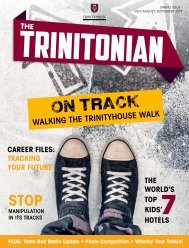Trinitonian 19
Create successful ePaper yourself
Turn your PDF publications into a flip-book with our unique Google optimized e-Paper software.
PARENTING ADVICE
The teen years are a time
for flexing the muscles of
independence, and your child
may object to your attempts to
monitor their online behaviour.
Partly this may be because they
themselves are not yet aware of
exactly what dangers can lurk
online.
Consider downloading the Klikd
app for them (it costs R450). It’s
a multi-module app by teens for
teens that deals with subjects
such as phone addiction,
cyberbullying, managing tricky
people online, dealing with
scammers, simulates online
“A journal or a voice
call or an in-person
visit is private, but
an online forum is
by definition not
private, so their
demands for a
right to privacy on
their phones is an
oxymoron.”
chats, online reputation and
more. Tweens and teens aged
between 10 and 15 complete
14 modules of the Klikdapp in
their own time over a year or in
a class, and they receive their
“social media license” at the
end of it.
“Contract with them that you will
check their phone,” says Klikd’s
Pam Tudin. You can safely rebut
their demands for “privacy”,
she says, by delineating what
is private and what is not. “A
journal or a voice call or an
in-person visit is private, but an
online forum is by definition not
private, so their demands for a
right to privacy on their phones
is an oxymoron.” In that sense,
you, reading their phone, are a
concrete representation of the
abstract, nameless and faceless
individuals who consume your
child’s online content or interact
with them digitally.
“Get to a place where you
can have less frequency and
more trust in monitoring them
online,” says Pam, “in that
they demonstrate repeated,
predictable behaviour in terms
of how they show up online.”
MANAGING SCREEN TIME AND
ONLINE BEHAVIOUR:
• Balance, balance, balance:
Allow your teen say an hour
of screen time, but then
expect that they spend an
hour in the real world, doing
a chore, exercise, seeing a
friend or cooking a meal.
• Who’s the parent? You
are: Just as you may set
a curfew or expect your
children to contribute in
some ways to the running of
the household, so you are
also allowed to set limits and
have expectations in terms
of online behaviour.
• To prevent unhealthy latenight
web surfing, it is a
good idea to take devices
away from bedrooms at
bedtime and charge them
overnight in the lounge or
your bedroom.
• Download an app such
as the Google Family Link
(or similar) that allows your
teenagers’ linked accounts
to be monitored for graphic
content, total screen time,
and that sets predetermined
“online” hours (such as
6am to 8pm). Understand,
however, that “net nannies”
are not failsafe and that a
determined enough user will
figure a way around their
restrictions.
• For general safety in the
real world, enable location
sharing on your child’s
phone or tablet so that you
can track their whereabouts
and vice versa. Google
Family Link offers this, but
many other apps such as
Life360 do too.
• Practise what you preach: If it
annoys you to be speaking to
your child almost exclusively
“in profile”, with their nose
buried in their phone, make
sure you also put your device
away when you’re with them.
Modelling good manners
is crucial for getting good
behaviour back.
28 | The Trinitonian

















